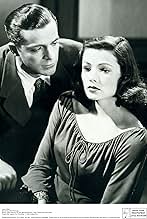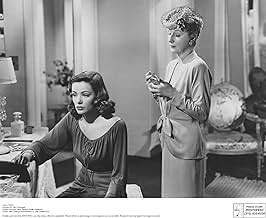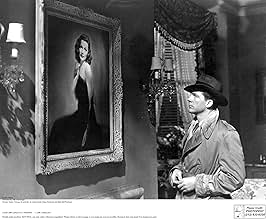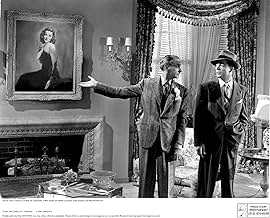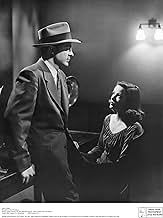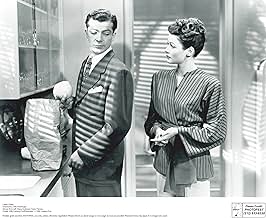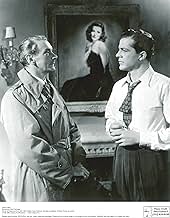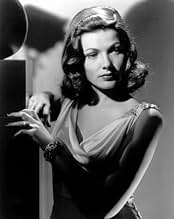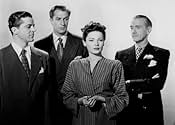Ein Polizeibeamter verliebt sich in die Frau, deren Mord er untersucht.Ein Polizeibeamter verliebt sich in die Frau, deren Mord er untersucht.Ein Polizeibeamter verliebt sich in die Frau, deren Mord er untersucht.
- 1 Oscar gewonnen
- 7 Gewinne & 5 Nominierungen insgesamt
Grant Mitchell
- Lancaster Corey
- (Gelöschte Szenen)
Dorothy Adams
- Bessie Clary - Laura's Maid
- (Nicht genannt)
Terry Adams
- Woman
- (Nicht genannt)
John Alban
- Executive
- (Nicht genannt)
Wally Albright
- Newsboy
- (Nicht genannt)
Bobby Barber
- Newsboy
- (Nicht genannt)
Edward Biby
- Party Guest
- (Nicht genannt)
Gary Breckner
- Narrator
- (Nicht genannt)
James Carlisle
- Party Guest
- (Nicht genannt)
Harry Carter
- Party Guest
- (Nicht genannt)
Lane Chandler
- Detective
- (Nicht genannt)
Bill Chaney
- Newsboy
- (Nicht genannt)
Dorothy Christy
- Woman
- (Nicht genannt)
Empfohlene Bewertungen
Laura is another brilliant addition to Hollywood's golden age with its incredible screenplay and a great non linear narrative structure. While it might not reach the heights of Double Indemnity or The Third Man, it is still a fantastic motion picture.
One thing that never seems to disappoint about ( Most of ) the classic Hollywood Film-Noirs is that they have incredible writing, and Laura is no different. The dialogue that is said is most of the time highly intellectual but shockingly coherent at the same time. This is especially the case whenever Waldo Lydecker ( Clifton Webb ) comes on screen, and his character, which is the vicious columnist, fits this poetic dialogue perfectly. ( Just look at the 'lunch' scene, or his narration near the end, or the narration where he describes Laura, as all of them have a superb screenplay ) Webb's impeccable delivery of these lines also helps ofcourse, as his performance is definitely the acting highlight of the show. Dana Andrews has the perfect face for this film noir detective kind of type, and his rugged and tough mannerisms fit perfectly for his character, although at times he might appear a bit wooden. Normally i do not care much for the outer look of women in film, but since Laura ( Gene Tierney ) is supposed to be this fascinating dame that everybody becomes obsessed with, it ofcourse helps that she is a looker, as this further enhances the immersion of the audience into the picture because it becomes relatable.
The indoor set design is as per usual in the golden age in Hollywood once again stunning. The cinematography uses a lot of low key lighting to capture the sinister and mysterious feel of the film perfectly, and the decoration of the sets is very elegantly created, with a lot of classic baubles in the background so the audience has enough to see in every shot in the entire film. The narrative is top notch, as it uses unpredictable twists and flashbacks created to enhance our relationship to the characters a bit more so we know what they were like before the 'murder'. Not a lot of characters are likeable, but those that are not likeable are so in a way that they still feel as if they were real people to which this is happening to. It is also a wonderful study on compulsive obsession ( The ending will show you why ) and man's nature to make rash decisions for the sake of love.
It does seem to be a bit too hasty near its final couple of minutes, but this is a slight issue that a lot of Hollywood films from this era seem to have. The haste is only there for the ending though, as the rest of the film is still executed wonderfully. The movie has the suspense in its narrative to keep the audience extremely interested in how its final events will unfold, and this creates a non stop thrill ride along the way.
Never does Laura insult our intelligence with obvious things, and instead it respects the audience's intelligence since every character seems to be highly intelligent in it, and the unpredictability of it further enhances this. It also has fantastic acting performances ( Especially Clifton Webb ) and a superb screenplay. Although the ending might seem to sudden, this still makes for a beautifully crafted Film Noir.
One thing that never seems to disappoint about ( Most of ) the classic Hollywood Film-Noirs is that they have incredible writing, and Laura is no different. The dialogue that is said is most of the time highly intellectual but shockingly coherent at the same time. This is especially the case whenever Waldo Lydecker ( Clifton Webb ) comes on screen, and his character, which is the vicious columnist, fits this poetic dialogue perfectly. ( Just look at the 'lunch' scene, or his narration near the end, or the narration where he describes Laura, as all of them have a superb screenplay ) Webb's impeccable delivery of these lines also helps ofcourse, as his performance is definitely the acting highlight of the show. Dana Andrews has the perfect face for this film noir detective kind of type, and his rugged and tough mannerisms fit perfectly for his character, although at times he might appear a bit wooden. Normally i do not care much for the outer look of women in film, but since Laura ( Gene Tierney ) is supposed to be this fascinating dame that everybody becomes obsessed with, it ofcourse helps that she is a looker, as this further enhances the immersion of the audience into the picture because it becomes relatable.
The indoor set design is as per usual in the golden age in Hollywood once again stunning. The cinematography uses a lot of low key lighting to capture the sinister and mysterious feel of the film perfectly, and the decoration of the sets is very elegantly created, with a lot of classic baubles in the background so the audience has enough to see in every shot in the entire film. The narrative is top notch, as it uses unpredictable twists and flashbacks created to enhance our relationship to the characters a bit more so we know what they were like before the 'murder'. Not a lot of characters are likeable, but those that are not likeable are so in a way that they still feel as if they were real people to which this is happening to. It is also a wonderful study on compulsive obsession ( The ending will show you why ) and man's nature to make rash decisions for the sake of love.
It does seem to be a bit too hasty near its final couple of minutes, but this is a slight issue that a lot of Hollywood films from this era seem to have. The haste is only there for the ending though, as the rest of the film is still executed wonderfully. The movie has the suspense in its narrative to keep the audience extremely interested in how its final events will unfold, and this creates a non stop thrill ride along the way.
Never does Laura insult our intelligence with obvious things, and instead it respects the audience's intelligence since every character seems to be highly intelligent in it, and the unpredictability of it further enhances this. It also has fantastic acting performances ( Especially Clifton Webb ) and a superb screenplay. Although the ending might seem to sudden, this still makes for a beautifully crafted Film Noir.
'Laura' is one of the most entertaining mystery movies I've ever seen. A mystery? Also a romance, a Film Noir and even in some ways a comedy. It's quite a unique movie from the legendary Otto Preminger, who took over from the original director and started from scratch. Gene Tierney plays the title character, a woman who seems to bewitch every man she meets. It's no wonder because Tierney is mesmerizing to watch. I think she could well be the most beautiful actress of all time. Dana Andrews, Vincent Price and Clifton Webb play the three men in Laura's life. Andrews ('Night Of The Demon') plays a detective investigating Laura's apparent murder, Price, years before becoming a horror icon, a gigolo type who is due to marry her, and Webb (best known as Mr. Belvedere) is a snobby columnist and wit who is Laura's mentor. All four actors are just terrific and the plot is full of twists and surprises. I enjoyed this movie from start to finish. 'Laura' is one of the very best Hollywood movies of the 1940s. Highly recommended
LAURA is, quite simply, as good as it gets as far as "film noir" is concerned.
Aside from an interesting story, a witty script, excellent B&W photography of elegant sets and the beautiful Gene Tierney as the center of attention, it works on every level imaginable. Dana Andrews has an intriguing role as the detective drawn to the portrait of Laura after believing her dead. And Clifton Webb has his star-making role of Waldo Lydecker, the snobbish and elegant man who seems just as obsessed with the dead woman as the detective. Adding to the impressive performances are Judith Anderson and Vincent Price.
The only flaw seems to be that Laura herself is not as well-defined in motives and background as the other players. But Gene Tierney's mesmerizing beauty hardly makes that important. Nevertheless, she is too passive in the role and actually gave far stronger performances in films like The Razor's Edge and Leave Her to Heaven, something she herself admitted--but her looks were never used to better advantage.
With several plot twists and turns, it keeps you thoroughly absorbed until it reaches its satisfying climax under Otto Preminger's knowing direction. Not to be missed, it's a classic of its kind.
For a detailed look at the career of DANA ANDREWS, see my current article on him in FILMS OF THE GOLDEN AGE, Summer 2001 with a look at all of his films and many photos.
Aside from an interesting story, a witty script, excellent B&W photography of elegant sets and the beautiful Gene Tierney as the center of attention, it works on every level imaginable. Dana Andrews has an intriguing role as the detective drawn to the portrait of Laura after believing her dead. And Clifton Webb has his star-making role of Waldo Lydecker, the snobbish and elegant man who seems just as obsessed with the dead woman as the detective. Adding to the impressive performances are Judith Anderson and Vincent Price.
The only flaw seems to be that Laura herself is not as well-defined in motives and background as the other players. But Gene Tierney's mesmerizing beauty hardly makes that important. Nevertheless, she is too passive in the role and actually gave far stronger performances in films like The Razor's Edge and Leave Her to Heaven, something she herself admitted--but her looks were never used to better advantage.
With several plot twists and turns, it keeps you thoroughly absorbed until it reaches its satisfying climax under Otto Preminger's knowing direction. Not to be missed, it's a classic of its kind.
For a detailed look at the career of DANA ANDREWS, see my current article on him in FILMS OF THE GOLDEN AGE, Summer 2001 with a look at all of his films and many photos.
Laura Hunt has been murdered in a most grisly way, a shotgun blast to the face as she answered her apartment door. Dana Andrews as Detective Mark McPherson is assigned to the case and he's got a good list of suspects to work from in this up close and personal murder.
Laura Hunt hung out with some real characters. Dana Andrews has a good group to choose from. There's Vincent Price who was to marry Laura, a worthless playboy who spends his life as a permanent party guest. There's Clifton Webb as the epicene critic and noted wit who was a kind of sponsor for Laura into society. There's Judith Anderson as Laura's sophisticated aunt who has a yen for Price. There's even Dorothy Adams as Bessie, Laura's lesbian maid who is carrying a titanic torch for her ex-employer.
Andrews very patiently and methodically goes through the suspects. In his way he's as officious and annoying as Lieutenant Columbo on television. But he does get to the truth. Of course there's one very big surprise for him during the course of the investigation.
Gene Tierney is Laura and she was a beauty in her day. Man or woman, who wouldn't be crushing out on her. This film was the first one that got Dana Andrews any real notice from the critics. And of course Clifton Webb made a screen debut in this after a long career on Broadway. Webb got an Oscar nomination for his role of Waldo Lydecker as a Best Supporting Actor, but lost to Barry Fitzgerald for Going My Way.
David Raksin's musical theme for this film is one of the great ones ever done for the cinema. So popular did it prove that Johnny Mercer wrote a lyric for it after the film came out. At the time people like Frank Sinatra and Dick Haymes and a host of others rushed to record it.
I guess you could classify Laura as a kind of sophisticated noir police drama. It's dialog will leave you begging for more. It's not much in the way of mystery because about a third of the way through you will realize at the same time Andrews does who the murderer is, maybe even before Andrews does. That doesn't matter though because Laura is entertaining every step of the way.
Laura Hunt hung out with some real characters. Dana Andrews has a good group to choose from. There's Vincent Price who was to marry Laura, a worthless playboy who spends his life as a permanent party guest. There's Clifton Webb as the epicene critic and noted wit who was a kind of sponsor for Laura into society. There's Judith Anderson as Laura's sophisticated aunt who has a yen for Price. There's even Dorothy Adams as Bessie, Laura's lesbian maid who is carrying a titanic torch for her ex-employer.
Andrews very patiently and methodically goes through the suspects. In his way he's as officious and annoying as Lieutenant Columbo on television. But he does get to the truth. Of course there's one very big surprise for him during the course of the investigation.
Gene Tierney is Laura and she was a beauty in her day. Man or woman, who wouldn't be crushing out on her. This film was the first one that got Dana Andrews any real notice from the critics. And of course Clifton Webb made a screen debut in this after a long career on Broadway. Webb got an Oscar nomination for his role of Waldo Lydecker as a Best Supporting Actor, but lost to Barry Fitzgerald for Going My Way.
David Raksin's musical theme for this film is one of the great ones ever done for the cinema. So popular did it prove that Johnny Mercer wrote a lyric for it after the film came out. At the time people like Frank Sinatra and Dick Haymes and a host of others rushed to record it.
I guess you could classify Laura as a kind of sophisticated noir police drama. It's dialog will leave you begging for more. It's not much in the way of mystery because about a third of the way through you will realize at the same time Andrews does who the murderer is, maybe even before Andrews does. That doesn't matter though because Laura is entertaining every step of the way.
I'm not sure if "Laura" truly qualifies as a film noir, although it certainly looks the part. If anything, it is a bridge between the standard romantic dramas of the '30s and '40s and the far darker truly noir films, such as "Double Indemnity," in which the main characters are either weak, desperate, or truly evil.
Tierney, here, is luminous as always, but hardly unsympathetic. And Andrews is your basic Dick Tracy -- colorless, but solid and honest. It's no surprise then that Webb walks off with the film, but his character is significant in other ways. Outwardly fey, Waldo is a variation on the stock "gay" Hollywood character seen at a time when homosexuality was hinted at but never really acknowledged. He insists he loves Laura, but there appears to be no actual love affair. He chooses her clothes and hairstyles, shows her off on his arm, but never seems to have any real physical contact with her. (The visual clue is his apartment, filled with pretty things that no one is allowed to touch, although Waldo will gladly tell you how expensive they are.) His scenes with Andrews become far more complex in this context, particularly when he discusses the case with the detective from his bath. Their verbal sparring continues throughout the film, and Webb makes frequent remarks about why women find Andrews' type so alluring, while they reject more "refined" males of taste and breeding. But Webb's Waldo, despite the refinement, is a catty and cruel little monster, a man who writes of love, but has none in his life. Unlike David Wayne's comic sissy in "Adam's Rib," who repeatedly proclaims his love and adoration for Katharine Hepburn's Amanda, Webb's Waldo has an edge so vile that we fear him, and, because of that, can accept him as a suspect.
The film is also notable for Vincent Price's performance as a needy boy-toy who is manlier than Webb, but still sexually vague, indecisive and weak. Viewers unaccustomed to seeing Price in such roles may think he was miscast. Perhaps he was, but he seems to be doing precisely what he was supposed to do, giving Laura another worldly but inappropriate suitor.
The plot, predictable or not, is great fun; a bit of a whodunit with a psychological edge. The score is legendary, and like the painting Andrews falls in love with, the music gives the film its haunting quality, particularly at those moments when we segue into another flashback.
There's a bit of inscrutability in most of Tierney's performances, which makes her perfect for this role. We rarely know what she's thinking, or precisely how she feels about the other characters. And because of this, her flashbacks provide few clues as to why anyone would want to murder her.
There are a few other suspects, of course, including the great Judith Anderson, and there's even a smart little cocktail party where you can look them over one more time. As for who really did kill Laura -- well, good luck with that one.
Tierney, here, is luminous as always, but hardly unsympathetic. And Andrews is your basic Dick Tracy -- colorless, but solid and honest. It's no surprise then that Webb walks off with the film, but his character is significant in other ways. Outwardly fey, Waldo is a variation on the stock "gay" Hollywood character seen at a time when homosexuality was hinted at but never really acknowledged. He insists he loves Laura, but there appears to be no actual love affair. He chooses her clothes and hairstyles, shows her off on his arm, but never seems to have any real physical contact with her. (The visual clue is his apartment, filled with pretty things that no one is allowed to touch, although Waldo will gladly tell you how expensive they are.) His scenes with Andrews become far more complex in this context, particularly when he discusses the case with the detective from his bath. Their verbal sparring continues throughout the film, and Webb makes frequent remarks about why women find Andrews' type so alluring, while they reject more "refined" males of taste and breeding. But Webb's Waldo, despite the refinement, is a catty and cruel little monster, a man who writes of love, but has none in his life. Unlike David Wayne's comic sissy in "Adam's Rib," who repeatedly proclaims his love and adoration for Katharine Hepburn's Amanda, Webb's Waldo has an edge so vile that we fear him, and, because of that, can accept him as a suspect.
The film is also notable for Vincent Price's performance as a needy boy-toy who is manlier than Webb, but still sexually vague, indecisive and weak. Viewers unaccustomed to seeing Price in such roles may think he was miscast. Perhaps he was, but he seems to be doing precisely what he was supposed to do, giving Laura another worldly but inappropriate suitor.
The plot, predictable or not, is great fun; a bit of a whodunit with a psychological edge. The score is legendary, and like the painting Andrews falls in love with, the music gives the film its haunting quality, particularly at those moments when we segue into another flashback.
There's a bit of inscrutability in most of Tierney's performances, which makes her perfect for this role. We rarely know what she's thinking, or precisely how she feels about the other characters. And because of this, her flashbacks provide few clues as to why anyone would want to murder her.
There are a few other suspects, of course, including the great Judith Anderson, and there's even a smart little cocktail party where you can look them over one more time. As for who really did kill Laura -- well, good luck with that one.
Wusstest du schon
- WissenswertesAccording to Producer and Director Otto Preminger, he had to work to win the respect of the cast, who all seemed "hostile" to him when he took over, with the exception of Clifton Webb. "I learned later", he said, "that Mamoulian had called each of them individually and warned them that I did not like their acting and intended to fire them." It was not true. Dame Judith Anderson decided to confront him on the set. She said that if he wasn't happy with her performance, then he should show her how to make it better.
- PatzerIn the initial long-shot when McPherson and Lydecker are out to dinner, McPherson's chair is unoccupied (about 15:28). When the camera is at their table, McPherson has materialized.
- Zitate
Waldo Lydecker: I don't use a pen. I write with a goose quill dipped in venom.
- Alternative VersionenA scene cut from the theatrical version after its initial release was restored to the film in 1990. In it, Waldo Lydecker described how he transformed Laura's appearance and introduced her to high society. The studio worried that this obsession with decadent luxury would be offensive to WWII soldiers serving overseas, so the scene was deleted.
- VerbindungenFeatured in Vicki (1953)
Top-Auswahl
Melde dich zum Bewerten an und greife auf die Watchlist für personalisierte Empfehlungen zu.
Details
Box Office
- Budget
- 1.020.000 $ (geschätzt)
- Weltweiter Bruttoertrag
- 1.356 $
- Laufzeit
- 1 Std. 28 Min.(88 min)
- Farbe
- Seitenverhältnis
- 1.37 : 1
Zu dieser Seite beitragen
Bearbeitung vorschlagen oder fehlenden Inhalt hinzufügen


